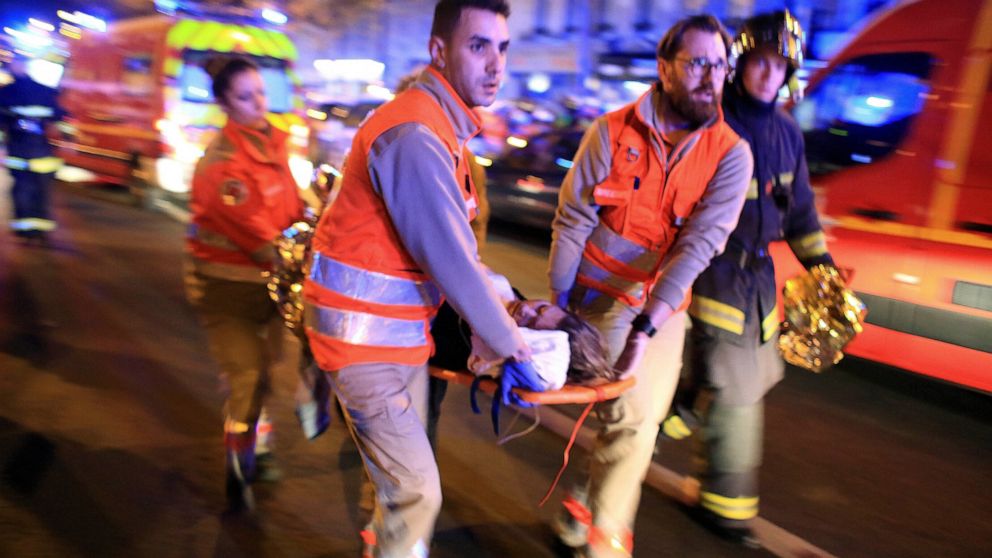PARIS – Screams of fear and panic. The thunder of gunshots. Dozens of dead bodies in pools of blood on the floor of the Bataclan concert hall. A Paris court on Friday released audio recordings and photos of the 2015 Paris terrorist attacks, which had never been released before, to reveal the night’s horrors.
Some survivors of the attacks cried while others left the courtroom in shock.
It was a harrowing end to a crucial week in the month-long trial over the November 13, 2015 Islamic State attacks on the Bataclan, cafes in Paris and France’s national stadium, which left 130 dead. With thousands of plaintiffs, this trial is among the largest in modern French history.
Lawyers and victims’ families saw this week as crucial to shedding light on what happened, but many of them felt frustrated.
The last surviving member of the attack team, Salah Abdeslam, and suspected accomplices were eventually questioned about the day of the attacks itself. They remained largely silent, refusing to answer most questions as the courtroom waited in breathless silence.
And when Abdeslam finally decided to speak briefly, instead of expressing remorse for his role in the attacks, he expressed regret that he had not detonated his suicide belt that bloody night.
“I didn’t go all the way,” Salah Abdelslam told the court on Wednesday. “I’ve given up wearing the (suicide) belt, not out of cowardice or fear. I didn’t want to, that’s all.”
Abdelslam dropped three attackers in a car, who blew themselves up on the forecourt of the French football stadium shortly after the start of a match between France and Germany. Abdelslam said he subsequently drove to the north of Paris and took the metro to the southern suburb of Montrouge, where he hid his explosive belt after claiming he did not have the courage to detonate it.
Abdelslam said he lied to his fellow attackers that the belt didn’t work “because I was ashamed of not going all the way. I was afraid of other people’s eyes.’ Abdelslam’s testimony contradicted the testimony of a police demolitions expert who had told the court that the demolition belt was faulty.
Then on Friday, the court heard audio recordings and was shown photos of inside the Bataclan concert hall that had never been released before.
The first shot marked the moment the attackers entered the theater. Music from the performers on stage – American band Eagles of Death Metal – can still be heard as the attackers fired non-stop shots from their automatic weapons for a solid minute. The crowd screamed and cried and the music stopped. And then the shooting starts again.
The second recording included the subsequent hostage situation, including the voice of a victim saying, “They’re going to blow everything up — they’ve got explosives.”
Then came the final attack: a volley of police gunfire followed by explosions from the attackers’ suicide belts. Then the evacuation, as the police ordered: “Go! Walk! We get out, hands up and run!”
The 20 photos included images all around the Bataclan Hall – the entrance, the balcony, the stairwell. blood is everywhere. One shows about 30 corpses in the dance ditch under the stage.
Some survivors cried while looking at the pictures. About 20 other people left the courtroom, visibly upset, as the audio played.
All of the attackers were killed that night, but Abdeslam fled France and traveled to the Molenbeek district of Brussels, where he grew up. He was arrested in March 2016. For years he refused to speak to investigators and he remained largely silent during the trial.
During Wednesday’s key session, Chief Justice Jean-Louis Peries spent an hour questioning Abdeslam. Again and again no answer.
Eventually, Abdeslam agreed to answer questions from just one of the plaintiffs’ many lawyers. He said three days before the attacks he planned to travel to Syria and was unaware of the attack plan until his brother Brahim informed him. Brahim Abdeslam blew himself up on November 13, 2015 after attacking a Paris cafe.
Abdelslam’s lawyers Olivia Ronen and Martin Vettes defended his reluctance. In a statement to The Associated Press, they said Abdeslam “exercised his right to remain silent” but then decided to answer questions from a lawyer for the civil parties who was “trying to understand what he had to say”.
A total of 20 people are on trial on charges such as planning an attack, supplying weapons and providing logistical support. Several are said to have been killed fighting for the Islamic State group in Syria and Iraq. The end of the process is scheduled for June.
———
Angela Charlton in Paris contributed to this.

